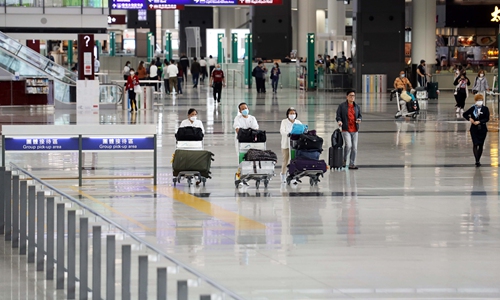
Only a few people arrive at Hong Kong International Airport on Friday, one day before the local government imposes a mandatory quarantine on anyone arriving from Italy, regions of France, Spain, Germany and Japan. (Photo: Global Times)
Hong Kong will ban all non-local residents from entering the city through flights and suspend transit services at the airport starting Wednesday, Chief Executive Carrie Lam announced on Monday, a move which analysts believe is the "strictest-ever" measure to deal with the mounting pressure of COVID-19 in the city as an international hub with a prosperous service sector.
People cannot enter through the mainland, Macao or Taiwan if they have been overseas in the past 14 days. All new arrivals, regardless of departure origin, have to undergo a 14-day quarantine, Lam said at a press conference on Monday.
She also said passengers coming from the US, the UK and the EU, even without any suspicious symptoms, need to accept nucleic acid testing.
Analysts noted such "strictest-ever" methods are necessary for Hong Kong, a gateway in South China. Otherwise, it could be a loophole in epidemic control work for the whole country if the city fails to curb the infections.
The measures are more stringent than those carried out during the 2003 SARS outbreak, which shows authorities are upgrading their methods amid a surge in imported cases from the COVID-19 pandemic, Tian Feilong, an expert in Hong Kong and Macao studies and associate professor at Beihang University in Beijing, told Global Times on Monday.
Tian also noted the latest measure shows that the Special Administrative Region government prioritizes residents' lives and health, while sharing the responsibility of epidemic prevention and control with the Chinese mainland under the "one country, two systems" principle. "It is a rational decision consistent with the needs of the current epidemic situation in Hong Kong," Tian said.
The Chief Executive also proposed a ban on alcohol at 8,600 bars, restaurants and entertaining centers as a few clustered infections have emerged from gatherings and banquets. She also noted that authorities will consult with the catering industry on diverting business operators from eat-in to delivery services.
Among 356 infections in Hong Kong so far, many turned out to have traveled overseas or contracted the virus through gatherings such as banquets and parties.
Police have found more than 40 people violating the home quarantine rules, with some destroying the smartband aimed at tracking people under home quarantine, Hong Kong media reported.
The smartband was designed to detect the real-time location of a quarantined person through analyzing the signal changes of telecommunications networks, WiFi, Bluetooth and GPS. But some people cut the band or turned them off to avoid being monitored.
Hong Kong has implemented compulsory home quarantines to all passengers to the city by putting electronic wristbands on arrivals. Yet some people supposed to undergo quarantine have shared their experience on social media of "escaping the home quarantine" and went shopping, which "exposed the loophole in relying on a tracking band and self-discipline to carry out the quarantine rules," Tian said.
A large number of foreigners work and live in Hong Kong, and not all of them strictly obey the government's isolation order, "which also brings risks to the city," he said.
Loose implementation of the quarantine rules in Hong Kong has prompted some analysts to warn that no place should be exempt from epidemic control. Otherwise, the mainland may have to pay the price.


